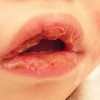Kawasaki disease and the T-cell antigen receptor
Abstract
We investigated the evidence for an infectious etiology of Kawasaki disease (KD), an acute vasculitis of unknown etiology, by assessing the effects of KD on the T cell antigen receptor variable beta region families (V beta). Using 3-color flow cytometry, we studied KD patients pre- and post-intravenous gamma globulin (IVIG) therapy and at > 40 days post therapy, additionally comparing them to matched pediatric control patients (PCC) and their own healthy parents (one parent/KD child).… Read more
